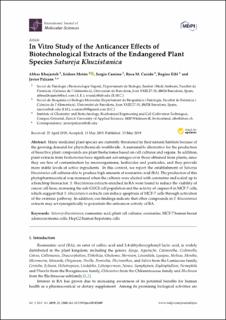Please use this identifier to cite or link to this item:
https://doi.org/10.21256/zhaw-19485Full metadata record
| DC Field | Value | Language |
|---|---|---|
| dc.contributor.author | Khojasteh, Abbas | - |
| dc.contributor.author | Metón, Isidoro | - |
| dc.contributor.author | Camino, Sergio | - |
| dc.contributor.author | Cusido, Rosa M. | - |
| dc.contributor.author | Eibl-Schindler, Regine | - |
| dc.contributor.author | Palazon, Javier | - |
| dc.date.accessioned | 2020-02-19T14:33:58Z | - |
| dc.date.available | 2020-02-19T14:33:58Z | - |
| dc.date.issued | 2019 | - |
| dc.identifier.issn | 1422-0067 | de_CH |
| dc.identifier.issn | 1661-6596 | de_CH |
| dc.identifier.uri | https://digitalcollection.zhaw.ch/handle/11475/19485 | - |
| dc.description.abstract | Many medicinal plant species are currently threatened in their natural habitats because of the growing demand for phytochemicals worldwide. A sustainable alternative for the production of bioactive plant compounds are plant biofactories based on cell cultures and organs. In addition, plant extracts from biofactories have significant advantages over those obtained from plants, since they are free of contamination by microorganisms, herbicides and pesticides, and they provide more stable levels of active ingredients. In this context, we report the establishment of Satureja khuzistanica cell cultures able to produce high amounts of rosmarinic acid (RA). The production of this phytopharmaceutical was increased when the cultures were elicited with coronatine and scaled up to a benchtop bioreactor. S. khuzistanica extracts enriched in RA were found to reduce the viability of cancer cell lines, increasing the sub-G0/G1 cell population and the activity of caspase-8 in MCF-7 cells, which suggest that S. khuzistanica extracts can induce apoptosis of MCF-7 cells through activation of the extrinsic pathway. In addition, our findings indicate that other compounds in S. khuzistanica extracts may act synergistically to potentiate the anticancer activity of RA. | de_CH |
| dc.language.iso | en | de_CH |
| dc.publisher | MDPI | de_CH |
| dc.relation.ispartof | International Journal of Molecular Sciences | de_CH |
| dc.rights | http://creativecommons.org/licenses/by/4.0/ | de_CH |
| dc.subject | HepG2 human hepatoma cell | de_CH |
| dc.subject | MCF-7 human breast adenocarcinoma cell | de_CH |
| dc.subject | Satureja khuzistanica | de_CH |
| dc.subject | Coronatine | de_CH |
| dc.subject | Plant cell culture | de_CH |
| dc.subject | Rosmarinic acid | de_CH |
| dc.subject | Adenocarcinoma | de_CH |
| dc.subject | Aziridine | de_CH |
| dc.subject | Bioreactor | de_CH |
| dc.subject | Caspase 8 | de_CH |
| dc.subject | Caspases | de_CH |
| dc.subject | Cell culture technique | de_CH |
| dc.subject | Cell cycle checkpoint | de_CH |
| dc.subject | Cell line | de_CH |
| dc.subject | Cell survival | de_CH |
| dc.subject | Cinnamate | de_CH |
| dc.subject | Cyclohexenes | de_CH |
| dc.subject | Depside | de_CH |
| dc.subject | Hep G2 cell | de_CH |
| dc.subject | Human | de_CH |
| dc.subject | MCF-7 cell | de_CH |
| dc.subject | Phytochemical | de_CH |
| dc.subject | Plant extract | de_CH |
| dc.subject | Medicinal plants | de_CH |
| dc.subject | Endangered specie | de_CH |
| dc.subject | Tumor | de_CH |
| dc.subject.ddc | 660: Technische Chemie | de_CH |
| dc.title | In vitro study of the anticancer effects of biotechnological extracts of the endangered plant species satureja khuzistanica | de_CH |
| dc.type | Beitrag in wissenschaftlicher Zeitschrift | de_CH |
| dcterms.type | Text | de_CH |
| zhaw.departement | Life Sciences und Facility Management | de_CH |
| zhaw.organisationalunit | Institut für Chemie und Biotechnologie (ICBT) | de_CH |
| dc.identifier.doi | 10.3390/ijms20102400 | de_CH |
| dc.identifier.doi | 10.21256/zhaw-19485 | - |
| dc.identifier.pmid | 31096565 | de_CH |
| zhaw.funding.eu | No | de_CH |
| zhaw.issue | 10 | de_CH |
| zhaw.originated.zhaw | Yes | de_CH |
| zhaw.pages.start | 2400 | de_CH |
| zhaw.publication.status | publishedVersion | de_CH |
| zhaw.volume | 20 | de_CH |
| zhaw.publication.review | Peer review (Publikation) | de_CH |
| zhaw.author.additional | No | de_CH |
| Appears in collections: | Publikationen Life Sciences und Facility Management | |
Files in This Item:
| File | Description | Size | Format | |
|---|---|---|---|---|
| 2019_Eibl_in-vitro-study.pdf | 1.91 MB | Adobe PDF |  View/Open |
Show simple item record
Khojasteh, A., Metón, I., Camino, S., Cusido, R. M., Eibl-Schindler, R., & Palazon, J. (2019). In vitro study of the anticancer effects of biotechnological extracts of the endangered plant species satureja khuzistanica. International Journal of Molecular Sciences, 20(10), 2400. https://doi.org/10.3390/ijms20102400
Khojasteh, A. et al. (2019) ‘In vitro study of the anticancer effects of biotechnological extracts of the endangered plant species satureja khuzistanica’, International Journal of Molecular Sciences, 20(10), p. 2400. Available at: https://doi.org/10.3390/ijms20102400.
A. Khojasteh, I. Metón, S. Camino, R. M. Cusido, R. Eibl-Schindler, and J. Palazon, “In vitro study of the anticancer effects of biotechnological extracts of the endangered plant species satureja khuzistanica,” International Journal of Molecular Sciences, vol. 20, no. 10, p. 2400, 2019, doi: 10.3390/ijms20102400.
KHOJASTEH, Abbas, Isidoro METÓN, Sergio CAMINO, Rosa M. CUSIDO, Regine EIBL-SCHINDLER und Javier PALAZON, 2019. In vitro study of the anticancer effects of biotechnological extracts of the endangered plant species satureja khuzistanica. International Journal of Molecular Sciences. 2019. Bd. 20, Nr. 10, S. 2400. DOI 10.3390/ijms20102400
Khojasteh, Abbas, Isidoro Metón, Sergio Camino, Rosa M. Cusido, Regine Eibl-Schindler, and Javier Palazon. 2019. “In Vitro Study of the Anticancer Effects of Biotechnological Extracts of the Endangered Plant Species Satureja Khuzistanica.” International Journal of Molecular Sciences 20 (10): 2400. https://doi.org/10.3390/ijms20102400.
Khojasteh, Abbas, et al. “In Vitro Study of the Anticancer Effects of Biotechnological Extracts of the Endangered Plant Species Satureja Khuzistanica.” International Journal of Molecular Sciences, vol. 20, no. 10, 2019, p. 2400, https://doi.org/10.3390/ijms20102400.
Items in DSpace are protected by copyright, with all rights reserved, unless otherwise indicated.